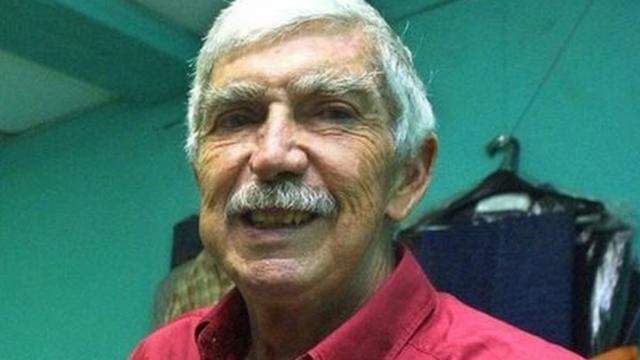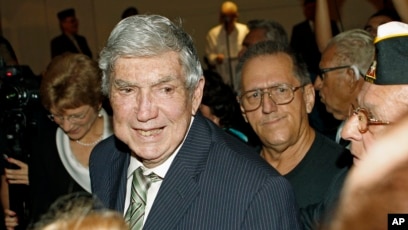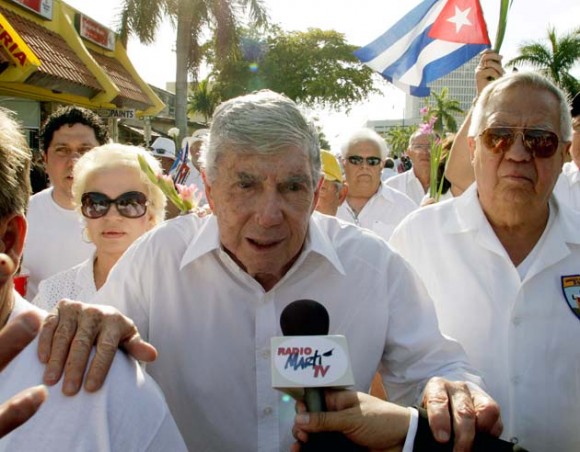Welcome to DU!
The truly grassroots left-of-center political community where regular people, not algorithms, drive the discussions and set the standards.
Join the community:
Create a free account
Support DU (and get rid of ads!):
Become a Star Member
Latest Breaking News
Editorials & Other Articles
General Discussion
The DU Lounge
All Forums
Issue Forums
Culture Forums
Alliance Forums
Region Forums
Support Forums
Help & Search
Latin America
Related: About this forumWorld News Cuba frees man who participated in 1997 attacks on hotels in Havana, orchestrated by Cuban exiles
Cuba frees man who participated in 1997 attacks on hotels in Havana, orchestrated by Cuban exilesBy ANDREA RODRIGUEZ
Updated 2:22 PM CST, December 31, 2024
HAVANA (AP) — Cuban authorities released a Salvadoran man who was convicted of participating in a string of hotel bombings on the island in 1997, a government-run news site said.
The Cubadebate website reported Monday in a lengthy editorial that Raul Ernesto Cruz Leon was freed after completing a 30-year prison sentence, but added that the men who planned the attacks have not been brought to justice.
“The liberation of Cruz Leon today, after completing his sentence, exemplifies the coherence of Cuba’s legal system,” Cubadebate said. “However we cannot forget that the intellectual authors of these terrorist acts … have lived and died in the United States without facing justice.”
In 1997, several hotels and bars in Cuba were bombed by enemies of Fidel Castro’s communist government, looking to undermine the island’s tourism industry. An Italian tourist was killed in one of the attacks.
The bombings were allegedly masterminded by Luis Posada Carriles, a Cuban exile who sought refuge in the United States in 2005 and died in 2018 without facing prosecution for the attacks.
More:
https://apnews.com/article/cuba-1997-hotel-attacks-salvadoran-freed-f14bba8a83cd4ee5e0944b37f2445e63
2 replies
 = new reply since forum marked as read
Highlight:
NoneDon't highlight anything
5 newestHighlight 5 most recent replies
= new reply since forum marked as read
Highlight:
NoneDon't highlight anything
5 newestHighlight 5 most recent replies
World News Cuba frees man who participated in 1997 attacks on hotels in Havana, orchestrated by Cuban exiles (Original Post)
Judi Lynn
Jan 2025
OP
Judi Lynn
(163,523 posts)1. More information: "Bomber Names Ex-CIA Operative In Cuba Attacks"
AP - Latin America
February 9, 2011 / 2:10 AM EST / AP
AP - Latin America
Bomber Names Ex-CIA Operative In Cuba Attacks
February 9, 2011 / 2:10 AM EST / AP
HAVANA (AP) - A Salvadoran man jailed in Cuba in connection with a string of 1990s hotel bombings says he told a U.S. prosecutor that he got explosives and money directly from a former CIA operative now on trial in Texas, and that he is willing to testify against him.
Otto Rene Rodriguez told The Associated Press in an exclusive interview Tuesday that he received powerful C-4 explosives and $2,000 in cash directly from Luis Posada Carriles to carry out an Aug. 3, 1997, bombing at Havana's Melia Cohiba hotel. He was captured trying to enter the country on a subsequent trip with 1.5 kilograms (3.3 pounds) of C-4 that Posada had given him, he said.
"Truthfully, looking me in the eyes he cannot say he doesn't know me," Rodriguez said. "He does know me. He used me like a tool."
Posada, 82, is not on trial directly for the bombing campaign - but rather for allegedly lying about his involvement to federal authorities during immigration hearings after he sneaked into the U.S. in March 2005.
Cuba's decision to make Rodriguez and another confessed bomber, Ernesto Cruz Leon, available for the AP interview was part of an effort to show its willingness to help in the U.S. case against the Cuba-born Posada, who is considered Public Enemy No. 1 on his native island.
More:
https://www.cbsnews.com/news/bomber-names-ex-cia-operative-in-cuba-attacks/
Judi Lynn
(163,523 posts)2. NY Times journalist Ann Bardach's large interview with CIA Cuban exile Luis Posada Carriles:
A BOMBER'S TALE; A Cuban Exile Details the 'Horrendous Matter' of a Bombing Campaign
By Ann Louise Bardach and Larry Rohter
July 12, 1998
During the summer of 1997, bomb explosions ripped through some of Havana's most fashionable hotels, restaurants and discotheques, killing a foreign tourist and sowing confusion and nervousness throughout Cuba. It was something shocking and inexplicable in a police state notorious for its tight security, and from one end of the island to the other, people speculated about who might be responsible.
At his office here in the mountains of Central America, a Cuban-American businessman named Antonio Jorge (Tony) Alvarez was certain he knew the answer. For nearly a year, he had watched with growing concern as two of his partners -- working with a mysterious gray-haired man who had a Cuban accent and multiple passports -- acquired explosives and detonators, congratulating each other on a job well done every time a bomb went off in Cuba.
What is more, Mr. Alvarez overheard the men talk of assassinating Fidel Castro at a conference of Latin American heads of state to be held in Margarita Island, Venezuela. Alarmed, he went to Guatemalan security officials. When they did not respond, he wrote a letter that eventually found its way into the hands of Venezuelan intelligence agents and officials of the United States Federal Bureau of Investigation.
Venezuelan authorities reacted energetically to the information, searching for explosives on the island where the meeting was to be held. But in the United States the letter elicited what Mr. Alvarez described as a surprisingly indifferent response. An agent in the Miami office reached him by phone, Mr. Alvarez recalled in recent interviews, and said a colleague would call soon to arrange to speak with him. In the meantime, he urged Mr. Alvarez to leave Guatemala immediately.
''He told me my life was in danger, that these were dangerous people, and urged me to get out of Guatemala,'' said Mr. Alvarez, a 62-year-old engineer. ''But I never heard from him again.''
Had the F.B.I. met with Mr. Alvarez, agents would have heard a remarkable tale about the anti-Castro underworld. They would have learned that the gray-haired man was Luis Posada Carriles, an anti-Castro exile who has devoted his life to overthrowing the Cuban Government. They would also have heard about possible links between the plotters in Guatemala and Cuban exiles living in Union City, N.J., who Mr. Alvarez said were wiring money to the plotters. That allegation raises questions about whether American laws were broken in the Cuban hotel bombings, in which an Italian tourist was killed and three people were wounded.
More:
https://www.nytimes.com/1998/07/12/world/bomber-s-tale-cuban-exile-details-horrendous-matter-bombing-campaign.html
Or, free access, if the 1st link doesn't allow:
https://web.archive.org/web/20190727094741/https://www.nytimes.com/1998/07/12/world/bomber-s-tale-cuban-exile-details-horrendous-matter-bombing-campaign.html

Young bomber Luis Posada Carriles, before being shot in the jaw.

Luis Posada Carriles, US Cuban exile C.I.A. man at one of his trials.




Surrounded by friends, always popular in Miami

Standing with co-author, Orlando Bosch, of the in-flight bombing of the Cubana airliner, no survivors, including the Cuban national fencing team, some of them teenagers.
By Ann Louise Bardach and Larry Rohter
July 12, 1998
During the summer of 1997, bomb explosions ripped through some of Havana's most fashionable hotels, restaurants and discotheques, killing a foreign tourist and sowing confusion and nervousness throughout Cuba. It was something shocking and inexplicable in a police state notorious for its tight security, and from one end of the island to the other, people speculated about who might be responsible.
At his office here in the mountains of Central America, a Cuban-American businessman named Antonio Jorge (Tony) Alvarez was certain he knew the answer. For nearly a year, he had watched with growing concern as two of his partners -- working with a mysterious gray-haired man who had a Cuban accent and multiple passports -- acquired explosives and detonators, congratulating each other on a job well done every time a bomb went off in Cuba.
What is more, Mr. Alvarez overheard the men talk of assassinating Fidel Castro at a conference of Latin American heads of state to be held in Margarita Island, Venezuela. Alarmed, he went to Guatemalan security officials. When they did not respond, he wrote a letter that eventually found its way into the hands of Venezuelan intelligence agents and officials of the United States Federal Bureau of Investigation.
Venezuelan authorities reacted energetically to the information, searching for explosives on the island where the meeting was to be held. But in the United States the letter elicited what Mr. Alvarez described as a surprisingly indifferent response. An agent in the Miami office reached him by phone, Mr. Alvarez recalled in recent interviews, and said a colleague would call soon to arrange to speak with him. In the meantime, he urged Mr. Alvarez to leave Guatemala immediately.
''He told me my life was in danger, that these were dangerous people, and urged me to get out of Guatemala,'' said Mr. Alvarez, a 62-year-old engineer. ''But I never heard from him again.''
Had the F.B.I. met with Mr. Alvarez, agents would have heard a remarkable tale about the anti-Castro underworld. They would have learned that the gray-haired man was Luis Posada Carriles, an anti-Castro exile who has devoted his life to overthrowing the Cuban Government. They would also have heard about possible links between the plotters in Guatemala and Cuban exiles living in Union City, N.J., who Mr. Alvarez said were wiring money to the plotters. That allegation raises questions about whether American laws were broken in the Cuban hotel bombings, in which an Italian tourist was killed and three people were wounded.
More:
https://www.nytimes.com/1998/07/12/world/bomber-s-tale-cuban-exile-details-horrendous-matter-bombing-campaign.html
Or, free access, if the 1st link doesn't allow:
https://web.archive.org/web/20190727094741/https://www.nytimes.com/1998/07/12/world/bomber-s-tale-cuban-exile-details-horrendous-matter-bombing-campaign.html

Young bomber Luis Posada Carriles, before being shot in the jaw.

Luis Posada Carriles, US Cuban exile C.I.A. man at one of his trials.




Surrounded by friends, always popular in Miami

Standing with co-author, Orlando Bosch, of the in-flight bombing of the Cubana airliner, no survivors, including the Cuban national fencing team, some of them teenagers.